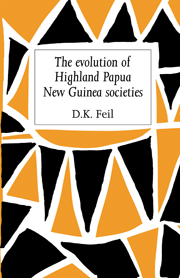Book contents
- Frontmatter
- Contents
- List of plates
- List of maps and tables
- Preface
- 1 Prologue: anthropology in the Papua New Guinea highlands
- 2 Papua New Guinea highlands prehistory: a social anthropologist's view
- 3 Configurations of intensity
- 4 Warfare
- 5 Leadership and politics
- 6 Social structure
- 7 Male–female relations
- 8 Ceremonial exchange
- 9 The legacy of the past
- Bibliography
- Index
- Frontmatter
- Contents
- List of plates
- List of maps and tables
- Preface
- 1 Prologue: anthropology in the Papua New Guinea highlands
- 2 Papua New Guinea highlands prehistory: a social anthropologist's view
- 3 Configurations of intensity
- 4 Warfare
- 5 Leadership and politics
- 6 Social structure
- 7 Male–female relations
- 8 Ceremonial exchange
- 9 The legacy of the past
- Bibliography
- Index
Summary
The Te introduces the element of credit, trust, of mediated and delayed exchange, which is finally completed and ratified publicly and ceremonially. This is an important economic advance. Exchange is no longer just face to face; but rather does it bind space and time. Individuals in a long series of communities are linked together in a common ‘transaction’
Elkin (1953:197)Consider the following depictions of exchange at opposite ends of the highlands:
Friendship, alas, seems harder than its opposite to promote or maintain. In addition to the need for friendly efforts to be continuous and often costly, they must also be essentially public and explicit … The quality of friendship is overt and assertive. Even fairly slight tokens of amity, accordingly, may be handled by Northern Tairora in an explicit, ceremonious, often flamboyant way. The style is so marked as sometimes to seem to outsiders either offensively boastful and ostentatious or grossly mercenary in its detailing of even the smallest consideration or favor, something to be counted like a debt, as it were, against one's vaunted friends.
Countergifts are typically required as a part of this same strenuous concern with public demonstration and acknowledgment. Much is clearly at stake … In the absence of sustained acts of amity, and sometimes even in their presence, the actor is free to worry and to suppose what he will
(J. Watson 1983:214–15).- Type
- Chapter
- Information
- The Evolution of Highland Papua New Guinea Societies , pp. 233 - 270Publisher: Cambridge University PressPrint publication year: 1987



